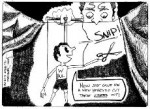WBUL could survive on Bay area revenue

Since its inception, USF’s student-run radio station WBUL has been under some form of University governance. Following its formation, the station was a student organization. In 2003, Student Government took the reins to help expand the station, most notably its budget.
But with the assistance came changes in administration, and now some senior members of WBUL are seeking full-fledged independence.
“We’re trying to avoid Rupert Murdoch syndrome,” music director Jake Tremper said in Thursday’s Oracle. “If SG controlled the Oracle, there would be all kinds of things called into question. Our battle cry has been, ‘We’re the voice of the student body, not the Student Government.'”
Tremper’s right. Not only would independence distance WBUL and SG from the possibility of perceived impropriety, it would also benefit the station, the school and the community as a whole.
WBUL’s market is gigantic. Aside from USF’s 30,000-plus students (many of whom commute), an estimated 3.7 million people live in the Tampa Bay area. Though reception tends to be weak anywhere but campus, weaned independence might afford the station previously unavailable creative and financial means to expand. With a stronger signal, WBUL could reach a larger part of the Tampa Bay area and expand its audience.
WMNF has proven the viability of independent radio in Tampa. Many of the city’s commercial stations are generic Clear Channel offerings, which more people seem to listen to out of necessity rather than choice. A matured, independent college radio station complemented by Tampa’s bustling music scene could reinvigorate the city’s radio market and grab thousands of listeners.
With those listeners would come an increase in local attention paid to USF, especially from younger demographics, which could lead to an expansion of Bulls Country from a string of businesses lining Fowler and Fletcher avenues.
True independence for WBUL will take quite some time, and the station’s fruition and success thereafter will take even longer. That said, a legitimate and independent student-run college radio station in the Tampa Bay area could be a huge source of revenue, interest and community for all parties involved.






